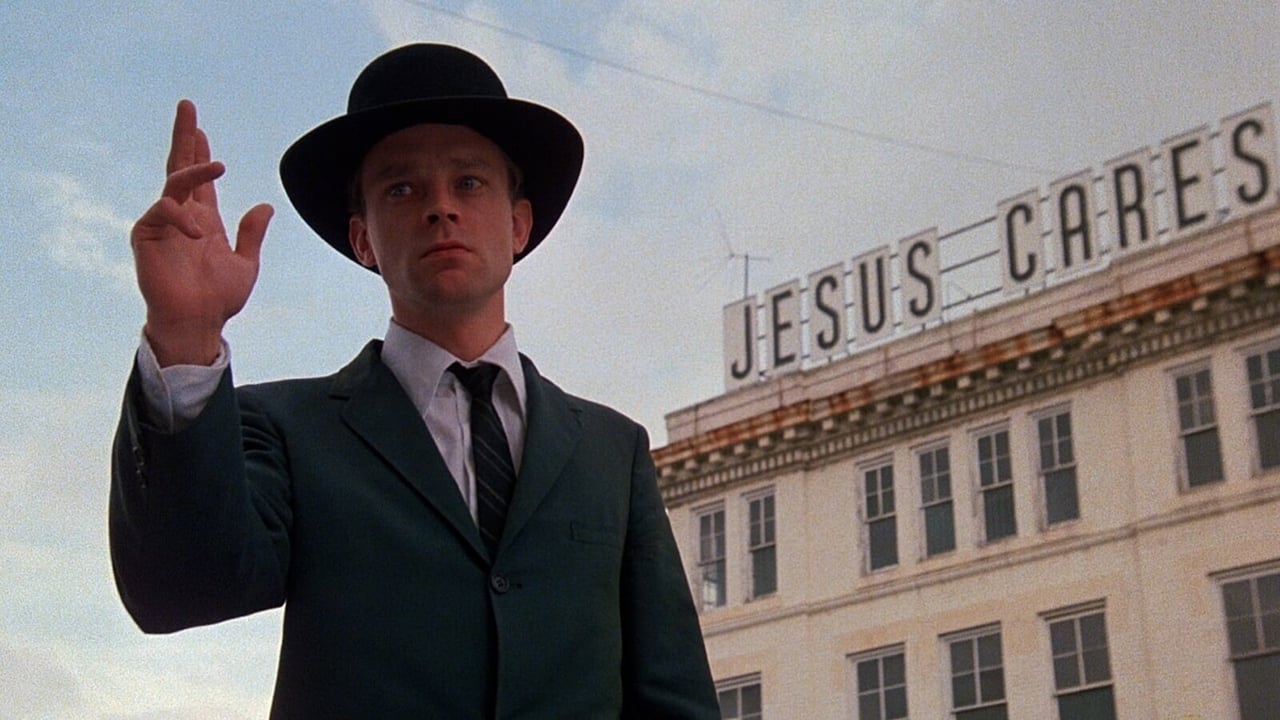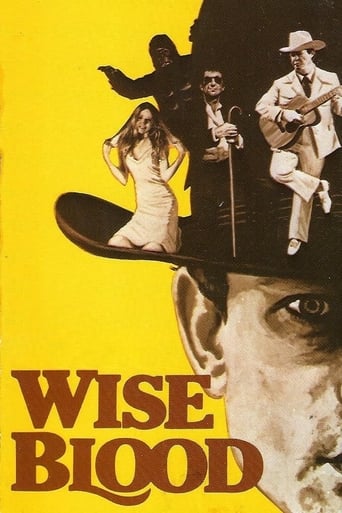Glucedee
It's hard to see any effort in the film. There's no comedy to speak of, no real drama and, worst of all.
Sameer Callahan
It really made me laugh, but for some moments I was tearing up because I could relate so much.
Bessie Smyth
Great story, amazing characters, superb action, enthralling cinematography. Yes, this is something I am glad I spent money on.
Yash Wade
Close shines in drama with strong language, adult themes.
flarrfan
This is a good movie, but it's not a great film. The book is great, and the movie is faithful to the book, which often reads like a screenplay because of the way O'Connor used dialogue. The director (Huston), with only a few minor deviations from the book's description of characters' inner thoughts, makes pretty much the point the author intended. For those confused about the director/author's viewpoint, I think Miss O'Connor's spoiler foreward to a later edition of the book gives it all away:"That belief in Christ is to some a matter of life and death has been a stumbling block for some readers who would prefer to think it a matter of no great consequence. For them, Hazel Motes's integrity lies in his trying with such vigor to get rid of the ragged figure who moves from tree to tree in the back of his mind. For the author, Hazel's integrity lies in his not being able to do so. Does one's integrity ever lie in what he is not able to do? I think that usually it does, for free will does not mean one will, but many wills conflicting in one man. Freedom cannot be conceived simply. It is a mystery and one which a novel, even a comic novel, can only be asked to deepen." Thus the mystery about meaning reflected in many of the comments here and on the message board, a mystery which even a black comedy film adaptation can only deepen as well.
tvspace
This is a very strange film -- disturbing and dark, but shot in an almost unaesthetic made-for-TV movie kind of way. Some of the musical choices, in particular, stand out as dated and goofy -- moments where things seem strange, disjointed and upsetting but are set to rollicking circus music (and not in an ironic way), as if the whole thing is in good fun.Because I haven't read the source material by Flannery O'Connor I'm unable to pass any judgment on how fully Huston captured the original characters. What I will say, is that as a child of the South in the 70's, there is a wistful documentary-quality to seeing the kind of ragged simplicity and charmingly trashy culture that we all grew up with back then. By comparison I think we have all become extremely self-conscious about a kind of forced cosmopolitanism by now (small batch mustard and all that jazz; beer connoisseurs; locally-sourced beef).As some other commenters noted, the casual use of the n-word by so many people seems unrealistic and shocking, in that amongst my middle class small-town family and acquaintances, it would never have been used, not out of political correctness per se, but because its use, back then, would have identified you as white trash (ironically enough). But, without meaning to sound disparaging, this story is in some sense about "white trash" so maybe in fact that is how people on the bottom of the social ladder spoke back then. (It's notable that the word isn't used with any meanness, but just out of a century of habit).This is not, by far, a great movie. But there is some really tremendous acting. Besides the obvious kudos for Brad Dourif, I found the most extraordinary performance to be that given by Amy Wright as Sabbath Lily. Erotic and sweetly screwed up, she provides the most human spark in a movie that is otherwise about some incredibly malignant and lost characters.For me as a fan of 1970's movies, this is a must-see, but I would advise going in that the film does seem extremely dated at times. Despite that it's interesting and unpredictable and full of dark psychological twists and turns that remind you how much more meaningful drama can be than the latest superhero movie at the cineplex.
Lechuguilla
The premise is fairly straightforward. Owing to bitterness and anger directed at his preacher father, a young Georgia man named Hazel Motes (Brad Dourif) sets out to start his own church, "the church of truth without Christ", founded on a belief system that deliberately contradicts the fundamentalist, orthodox beliefs of his Southern heritage.The essence of this film is Hazel Motes. Everything else orbits this central character. And what a character! Maybe his motives are pure; maybe he means well. But his perspective is blatantly and wildly distorted, even grotesque. His fanatical obsession toward his rebel cause blinds him to reality and the goodness around him. He insults those he comes in contact with. His hateful self-righteousness leads to opinionated, combative personal relations. Dourif's acting amplifies Motes' repugnant personality. I found both the character and the actor very hard to take.By contrast, Motes' ambient Southern environment seems much more real and inviting. I can easily connect with the Southerners in this film, and the non-professional actors and extras that appear. Further, the prod design mirrors quite well the poverty and general bleakness of the South in the era the film was made. That culture is rich in atmosphere and history. Yet there's an undeniable melancholy and depression that washes over the entire region. And the film does a good job of expressing that mood."Wise Blood" is a product of the turbulent era of the late 60s and early 70s, a period of intense suspicion toward all institutions, including organized religion. The director, John Huston, did not like religion. Given these antecedents, the film is bound to come across as slightly heretical to some viewers.I react to this art-house film with ambivalence. I dislike intensely the character of Hazel Motes. And I think Dourif overplays the role. Yet I appreciate the script's underlying premise with the accompanying conflicts, contradictions, and humor that a well-developed story can lead to. And I like the Southern setting, authentic and down-home.An adequate interpretation of this film requires the viewer's full attention. "Wise Blood" is most assuredly a black comedy. Yet it is not a film to take lightly.
Kenneth Anderson
When novels are adapted by writers who know the book so well that they are unable to see past their familiarity to judgeif the screenplay stands on its own as a cohesive, compelling story with three acts and understandable character motivations, the result is something like John Huston's "Wise Blood." A movie so academically faithful to its source material that it fails miserably as a motion picture that makes any narrative sense.As a companion piece to Flannery O'Connor's novel, it is a fine visual representation of the characters and events recounted. As a stand alone film, it virtually makes no sense and things happen only because the book says so, not because the film gives them any organic reason to.I defy anyone who hasn't read the book to make any sense out of the character of Enoch Emory. Likewise the origins of the matrimonial feelings of the boarding house landlady. Both parts are well acted, but the writers leave in all the novel's "business" and are hamstrung at finding a way to convey the motivations behind them.The best things about the film are Brad Dourif and Amy Wright. Dourif especially works miracles with a character that is underwritten on the screen but vivid on the page. In fact, most of the cast works extremely hard to bring some humanity to their characters, but they are ill-served by a script that fails to understand the special considerations required of telling a story on film and telling one on the page. The screenwriter obviously held O'Connor in such awe that he was afraid to do any thinking on his own.

